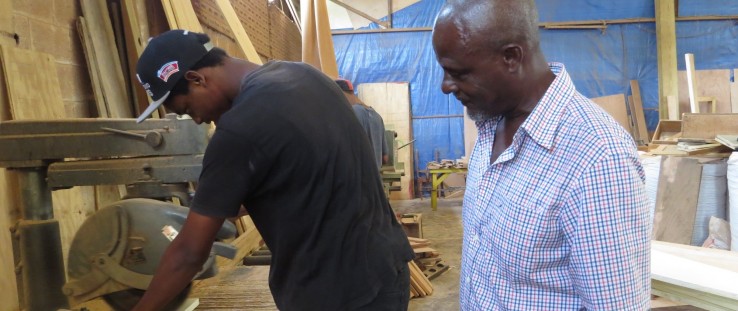 Tre Espirit uses the USAID-funded radial arm saw under the watchful gaze of his teacher, master craftsman John Riviere.
Carol A. Gaskin, USAID
Tre Espirit uses the USAID-funded radial arm saw under the watchful gaze of his teacher, master craftsman John Riviere.
Carol A. Gaskin, USAID
 Tre Espirit uses the USAID-funded radial arm saw under the watchful gaze of his teacher, master craftsman John Riviere.
Carol A. Gaskin, USAID
Tre Espirit uses the USAID-funded radial arm saw under the watchful gaze of his teacher, master craftsman John Riviere.
Carol A. Gaskin, USAID
Speeches Shim
It’s late evening and John Riviere moves purposely around Dominica’s premiere furniture factory, teaching the trade he has loved for over half of his adult life to youngsters in his care. He hopes this can help to get them off the streets.
“I love the youth and I like to help people,” says the 64-year-old former plumber, who admittedly stumbled across his passion.
“Many years ago I branched out from plumbing, and I fell in love with wood. I started buying books, and I trained myself in woodwork. I really don’t know what attracted me,” he adds with a chuckle.
Concerned about rising youth unemployment, crime and deviance in the Nature Isle, as Dominica is known, Riviere gave up construction in 1975 to spearhead an initiative by the Dominica Employers Federation teaching woodcraft to at-risk youth.
“We were approached to lead this initiative since many youth were hanging out on the streets and getting into trouble. The idea was to teach them skills so that they could find work,” explains Riviere. He and a friend formed a cooperative and started teaching youth to repair discarded furniture, then to refurbish and sell it.
In 1982, Riviere received a $16,000 grant and technical assistance from USAID, which allowed him to expand the cooperative and the level of training provided to youth. “We were using hand saws and other hand equipment, so we really needed proper equipment to make the furniture,” he says.
Thirty-four years later, that equipment is still being used by Home Industries Cooperative, now Dominica’s premier furniture production company, to provide youth with the woodworking skills needed to become gainfully employed. The company’s furniture can be found in Dominica’s major department stores.
In recent years, Riviere has been partnering with Dominica’s Youth Center to train youth—this time those enrolled in USAID’s A Ganar program. He is also about to embark on training at Dominica’s State Prison.
The A Ganar program uses sports, life skills and job training to place at-risk youth, including those who have dropped out of school, on productive paths. A total of 345 youth registered for the A Ganar program, of which 74 percent graduated. More than 130 are pursuing further studies or are gainfully employed.
“In my involvement with A Ganar, I have also trained quite a number of kids. I was very happy with one particular individual. In the first three months that she was on assignment here, she built a bed and was able to take it home. I felt very proud of that little girl,” the tutor reminisces.
“I think it is a very good program, which helps to develop youth. It gives them discipline and helps to get them organized,” Riviere added. “The last set of five guys I have here—I really wish I could help them to start their own business. Because of their interest and potential, I would love to see them moving forward.”
Some graduates of the program have gained employment, while others benefitted from internships, some within the woodwork industry.
At 17, Tre Espirit is an A Ganar graduate and one of Riviere’s woodwork students. “I wasn’t really doing well in school,” he explains, “so instead of staying home with my grandmother, I decided to start the program. It has been helpful. If I wasn’t participating in the program, I would be sitting by the roadside doing nothing and likely to get into trouble.
“As the skills training is there, it is better to take the opportunity to do it now, rather than later. A trade is always important,” he maintains. “My granny is very proud of me.”
Job James, 24, said the program provides the “total package.” In addition to the master craftsman teaching students how to make furniture, says James, the program provides students with general business training, including invoicing and customer relations.
“When I walk through the streets, I encourage other young people to visit the youth center, rather than just stay at home and do nothing. I wish that, across the island, there were more programs like this available to young people,” James says.
Riviere, noting that other furniture operators are also giving back by offering training and jobs to youth, reiterates his personal commitment to the woodwork industry and young people. “I am not sure how long I will be around, but I intend to give all of my time and efforts to passing on my knowledge,” he says.
Looking Ahead, Looking Back
With many of the smaller workshops on the island traditionally looking toward Home Industries for leadership and assistance, Riviere eagerly anticipates the installation of a solar dryer or steam plant on the island. Rather than cutting timber on a band to create curves, the steam could be used to bend the wood. A solar dryer would cut the timber drying time in half, improving efficiency.
Many of the young people who received Riviere’s tutelage during his first connection to USAID now support themselves and their families through this trade. “I have taught more young people than I can count,” says Riviere.
While the project started with 12 youth, the number has multiplied rapidly over the years.
“Sometimes there were at least 28 youth being trained here at the same time, and that cycle kept being repeated. Of the six furniture operations on Dominica, all of the artisans were trained with Home Industries. All of them are employed, so this is all as a result of USAID’s contribution,” says Riviere, pointing out some of the original tools acquired through the USAID grant.
Stating with pride that all of his “children” have excelled, Riviere said it is always nice when his former pupils come back to visit him.
Recently acknowledged by Ambassador Linda Taglialatela for his commitment to the development of Dominican youth, Riviere maintains that “without USAID, this organization would not be existing today. Without USAID, many people in my country would not have been trained. I am looking forward to future partnerships which can further develop our youth and this vital industry.”


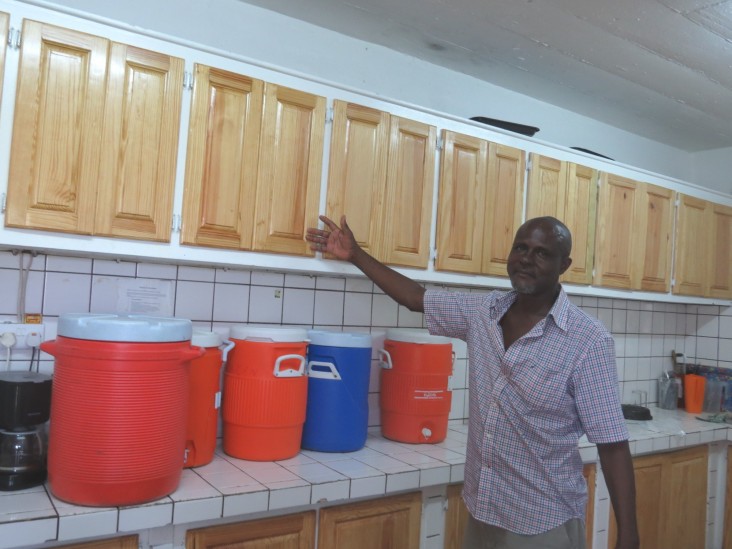
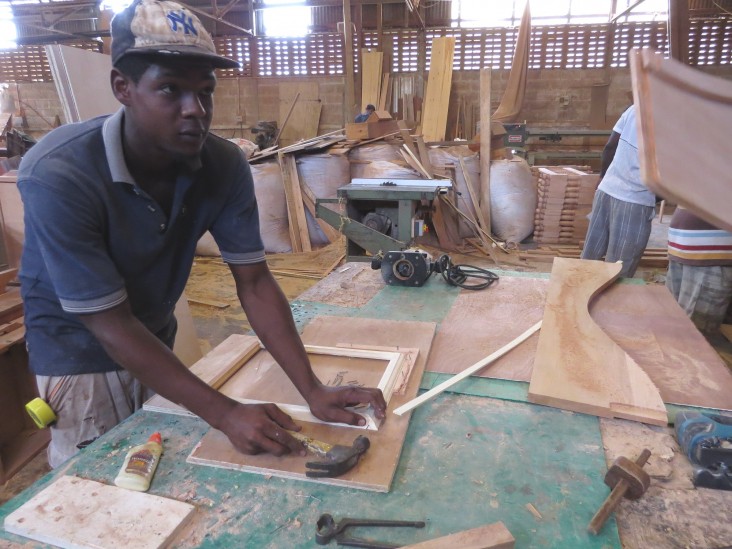
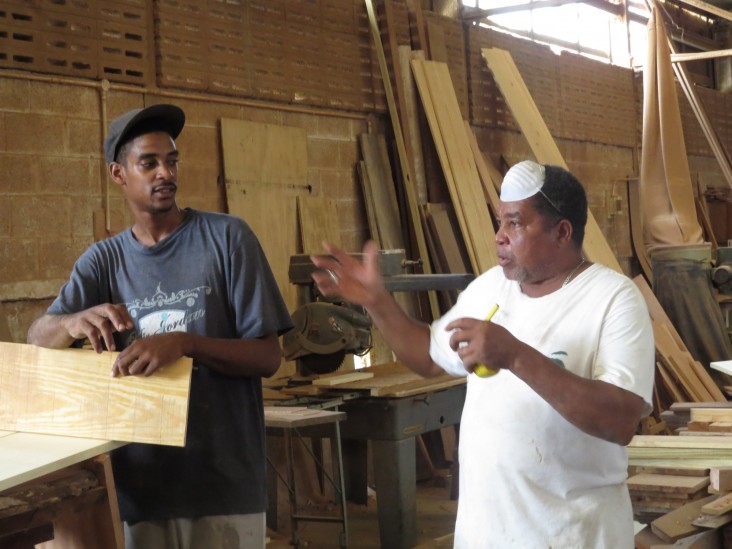
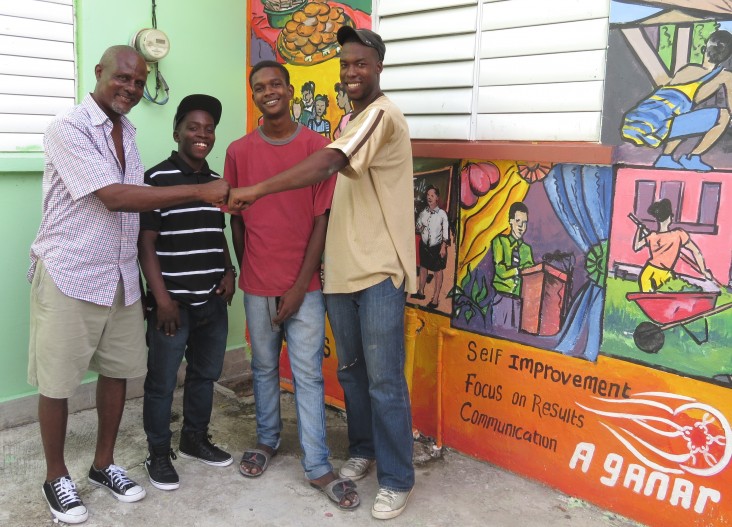

Comment
Make a general inquiry or suggest an improvement.